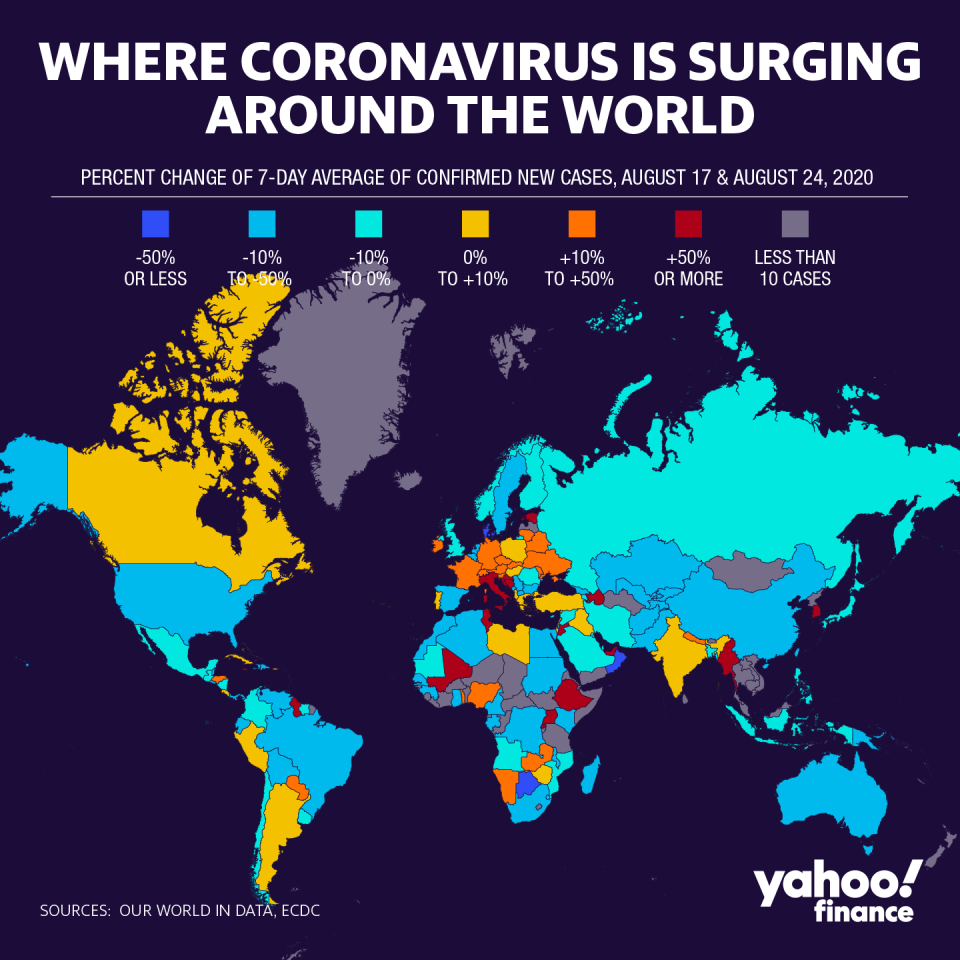Feds may not mandate a coronavirus vaccine, but states, schools and employers can
The multiplicity of questions surrounding the deployment of an effective coronavirus vaccine include its aggressive development timeline, who’ll get access first, how to encourage people to take it, and whether it’ll work at all.
Still, there’s one key question that remains unanswered: Can governments — which are incurring considerable expenses to accelerate the development of a successful vaccine — forcibly inoculate their citizens?
That question was partly answered last week by Virginia, where the state’s top health official vowed to make a COVID-19 vaccination mandatory once a candidate was widely available. His stance underscored a theme several health experts emphasized: There are several (entirely legal) avenues by which the public can be compelled to take a COVID-19 cure, whether they want to or not.
Generally speaking, the federal government’s options to mandate vaccinations are circumscribed, according to Richard Hughes, managing director and vaccines leader at Avalere, a DC-based health care consultancy.
“Public health regulation has been left to the states, so I don’t see the federal government superseding states,” Hughes told Yahoo Finance in a recent interview.
With that being said, schools and employers are empowered by law to require students and workers to be vaccinated, Hughes explained. While “states legally could require everyone to do that...politically it would be very challenging,” he added.
Yet there are other ways in which governments can limit the ability of citizens to opt-out for reasons unrelated to health or religion. Many countries already require travelers to be vaccinated for certain diseases in order to cross their borders, and a potential COVID-19 inoculation is more than likely to join that list.
“Assuming an effective vaccine, countries, states and localities have broad leverage to promote the vaccine under current law,” Farley Cleghorn, a physician and global health practice head at consultancy Palladium, told Yahoo Finance.
“Countries can legally mandate vaccination to cross borders, as with yellow fever, and schools from kindergarten to universities can legally require vaccination for entry, as in much of the world for the expanded program of immunization and with limited medical exemptions,” he said.
Additionally, federal guidance defines COVID-19 as a “direct threat” to workplaces, meaning employers are permitted to implement anti-coronavirus protocols like temperature checks and testing, according to Cleghorn.
“If a vaccine is developed, employers may be able to require employees to become vaccinated and will have to evaluate accommodations for religious beliefs and/or disabilities,” he added.
The power to ‘promote public health’

With economic recovery expectations yoked inextricably to hopes for a vaccine by 2021, and the imperative to achieve herd immunity, officials have an incentive to get as many people inoculated as possible.
Yet that’s easier said than done in a wary electorate where universal mask-wearing remains a polarizing issue, and domestic anti-vaccination sentiment has hit a fever pitch.
Vivek Cherian, an internal medicine physician and a member of the American College of Physicians, told Yahoo Finance that “the best hope to fully reopening the economy and getting back to our pre-pandemic lives in large part comes down to development of a successful vaccine.”
However, Cherian pointed out that “a large portion of the U.S. population either delay or completely skip vaccinations” — including seasonal flu shots, which less than half of adults actually get each year, he said.
For those reasons, state governments “generally have the power to promote public health and require mandatory vaccinations. The bigger issue about either state or federally mandated vaccinations would be how controversial the decision would be viewed as,” Cherian added.
In the midst of a furious debate about sending children back to school in the midst of the pandemic, giving students a theoretical COVID-19 shot poses challenges of its own, according to Elaine Le, Healthline Media’s chief medical officer.
If a vaccine becomes available, “most parents would likely be leery of having their children be among the first to receive a vaccine, especially since children are not among the highest risk demographic affected by COVID-19,” Le told Yahoo Finance.
“Most parents would likely err on the side of caution and might opt to wait until more is known about the efficacy and safety of the new vaccine. Therefore, it would be difficult for schools to mandate the new vaccine in all school-age children,” she added.
“Usually, the decision to require a specific vaccine for school attendance is predicated on calculated benefits that far exceed the risks associated with the vaccine,” Le said.
“In this situation, it will be difficult to argue that the benefits would outweigh risks (for a fast-tracked vaccine), especially given that school-age children (or even college students) are not among the high-risk category,” she argued.
The trouble with herd immunity

According to a recent survey taken this month by The Harris Poll, 69% said they were somewhat or very likely to get the vaccine — below the accepted herd immunity threshold and reflecting a deep undercurrent of skepticism over a development process that normally takes years, but is being compressed into a matter of months.
Given the likelihood that an effective inoculation will fall short of 100%, experts say 75% would be ideal in preventing person-to-person spread.
However, that assumption is based on the idea that “ everyone is either vaccinated or already had the virus and is now immune, according to Cherian.
Yet the biggest caveat is if large swaths of the public skip vaccination, imperiling the ability to achieve herd immunity.
“I would say the skepticism about COVID-19 and the pandemic, and the belief that it’s a hoax...overlap with people that don’t want to wear masks and those who are vaccine hesitant,” Hughes explained. Those sentiments cut across racial and ethnic lines, and pose a stiff challenge to officials who need to encourage widespread vaccinations.
Of those surveyed by Harris’ poll, an overwhelming majority felt that health care and essential workers, seniors, and the immunocompromised should receive priority for vaccination — groups that Avalere’s Hughes said would be “in the front of the line” when a treatment became available.
Some have suggested that Blacks, who have been among the hardest hit by COVID-19, should also receive priority.
Yet that effort is complicated by the fact that “we have a history in this country...where African Americans don’t want to be experimented on,” Hughes said. “But there’s a balancing act here of considering the ethical questions and more balancing the risks and potential horrors.”
Absent a government mandate for a COVID-19 shot, experts stress that officials need to engage the public on the merits of taking the vaccine, and its safety.
It’s part of a broader campaign that Palladium’s Cleghorn called “the need to have a national conversation about access to and affordability of a coronavirus vaccine, [and] to the need to engage communities at most risk for virus transmission and vulnerability to the impact of COVID-19.”
Javier David is an editor for Yahoo Finance. Follow him on Twitter: @TeflonGeek
Find live stock market quotes and the latest business and finance news
For tutorials and information on investing and trading stocks, check out Cashay
Follow Yahoo Finance on Twitter, Facebook, Instagram, Flipboard, LinkedIn, and reddit.
